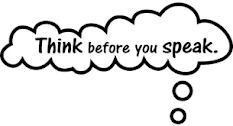What does Pirkei Avot have to say about anger management? Anger is a normal human reaction and we are all humans so, while anger is not prohibited, we are praised for being slow to anger and swift to calm down again (Avot 5:14). It’s also a good idea not to engage as a teacher anyone who gets angry with students or pupils (Avot 2:6). A further teaching, at Avot 4:23, has recently found its way into a Times of Israel blogpost on account of its topicality. There, among other things, R’ Shimon ben Elazar tells us:
אַל תְּרַצֶּה אֶת חֲבֵרֶֽךָ בְּשַֽׁעַת כַּעֲסוֹ
“Do not appease your friend at the height of
his anger”.
In her
article, “Liz’s Legacy”, Ariella Cohen comments on the recent debacle when the
heads of three of the most prestigious universities in the United States—Harvard,
MIT and Penn—testified at a Congressional hearing to the effect that a
context-appropriate call for genocide against the Jews would be tolerated on
their campuses. Penn head Liz Magill subsequently sought to apologise for her
statement and later resigned. In the course of her blogpost Cohen comments:
After the Congressional hearing, I was more
upset by Liz Magill’s attempted apology than by her original remarks. Some
things cannot be apologized for. Especially not while the wound is raw. You
cannot emotionally rip somebody (or group of people) apart and then tell them
the next day that you didn’t actually mean it. Or rather you can, but it’s
completely unacceptable. We know from Pirkei Avot 4:23 that Rabbi Shimon ben
Elazar teaches: “Do not appease your friend in the time of his anger…” I don’t
think Liz regularly reads through Pirkei Avot, so she is probably not familiar
with this teaching. But it is an extremely smart and poignant one which she
violated. Trying to calm someone (or in this case, Jews all over the world)
immediately after severely affronting them on a national level is ill-advised.
Avot Today
has already commented on the concept of context and is not revisiting the issue
here. The question now before us is whether Cohen is right to apply this mishnah
from Avot. While I am in agreement with the general content and thrust of her
article, I would respectfully question whether she is taking R’ Shimon ben
Elazar’s teaching further than it actually goes.
First, let
us consider who is being appeased. The mishnah as it stands does not differentiate
between appeasing a friend (i.e. anyone at all) you have angered and someone
who has been angered by something from outside your relationship with your
friend. The Me’am Lo’ez assumes that it refers to placating a person you
have personally angered, while the Sforno’s commentary appears to imply the
opposite and the Ru’ach HaChaim makes it refer to appeasing God. In all
cases, however, the mishnah presupposes some sort of direct and immediate
relationship between the would-be appeaser and the one who is angry. Having the
angry person in sight, in the words of R’ Yitzchak Greenberg (Sage Advice),
enables the would-be appeaser to gauge whether the latter has used up all his
anger before seeking to calm him down; it is only then that he will likely be
amenable to reason and/or to any soothing speech. This is clearly not the case
when the cause of the anger is a public statement that goes viral and angers many
millions of people, spread over five continents, who are almost entirely
unknown to the speaker and unreachable in terms of human contact.
Secondly we
should ask whether, in the case of a public statement of this nature, one
should delay at all before issuing an apology or retraction. The feelings of 16
million Jews are only one factor to be considered. Failure to implement an
immediate damage limitation exercise runs the risk that others will publicly
approve the offensive words and cite them as a respectable authority for the extermination
of the world’s Jewish population. Others again may feel emboldened to commit
acts of violence against Jews and vandalism against their property. If there is
even the smallest risk of such an outcome, no time should be lost in waiting
for the world’s Jews to stop being angry.
The last
word goes to Rambam. In his commentary on Avot he says simply that a person
should not make statements except in a situation where they will have an
effect. This is ultimately a judgement call that each individual must make for
himself. In my view, Liz Magill was wrong to say what she did, but right to apologise
sooner rather than later. What a shame it is that her words of apology did not
sound more convincing.
For comments and discussion of this post on Facebook, click here.
